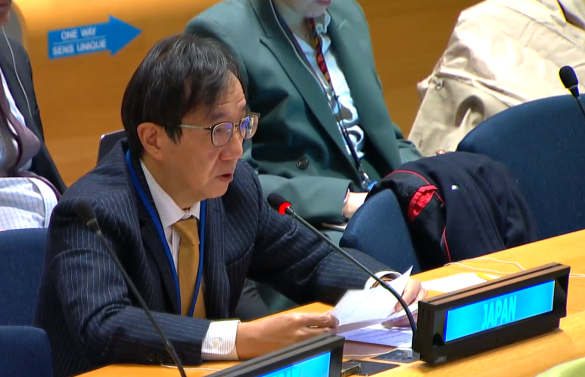Joint G4 Statement by Brazil, Germany, India, and Japan, delivered by H.E. Ambassador YAMAZAKI Kazuyuki, Permanent Representative of Japan to the United Nations, at the Informal Meeting of the General Assembly on the Intergovernmental Negotiations on Security Council Reform
2024/11/21

(As delivered)
Thank you, Co-Chairs.
I deliver this statement on behalf of the G4 – Brazil, Germany, India, and my own country, Japan.
Thank you very much for convening this round of structured dialogue dedicated to models of reform. The last session’s series of concrete discussions on each model presented both orally and in writing have proven to be useful, rather than abstract speeches. We fully support this continued initiative by the Co-Chairs, and are committed to a sincere and productive discussion.
With this in mind, we are grateful to Liechtenstein for its constructive and practical participation, including through the presentation of its revised model today. We are also eager to see the timely submission of more models.
In a spirit of good-faith engagement with the delegation of Liechtenstein, we would like to pose the following six questions:
First, at the outset, in Part I para 2, we are still grappling with understanding the contradiction between “permanent basis” and “renewable term,” which is the key defining feature of the amended model proposed by Lichtenstein. For the sake of clarity, we view that this model is limited to expansion in the non-permanent category only as per the UN Charter, and the semantics of “serving on a permanent basis” does not accurately reflect this essential point.
As we and others have repeatedly argued, any reform that does not make the permanent category, the core power in the Council, more representative, will not truly address the organ's diminishing legitimacy, and therefore will not be a true reform.
Please elaborate on how your proposal for renewable long-term seats would ensure enhanced representation in the core power in the Council and therefore its legitimacy.
The second question- In light of the previous question, how do you think the historical injustice vis-à-vis Africa can be fully addressed through your model?
Third question- In Part I paras 3 bis. and ter., we would like to hear from you the rationale for identifying the League of Arab States and Small Island Developing States (SIDS) as groups which deserve special consideration. As we reiterate our openness to discussing cross-regional representation, please elaborate on any criteria you may have used to justify such consideration.
Fourth, In Part I para 9, you clarified that a review includes “all issues relevant to Security Council reform,” though the original language could also include the same. Did you have any specific reason why you chose to emphasize this point?
Fifth question- In Part II para 3, you propose “an equal distribution among Members of the Security Council of Chairs and Vice-Chairs of subsidiary bodies of the Security Council.” It would be appreciated if you could elaborate on what “equal distribution” would entail in this context.
Do you mean a total number of posts for P5 versus E10, like 5 vs 10? Given the current situation where all Chairs of subsidiary bodies are E10, would it not deprive them of opportunities to participate?
The sixth and last question- In Part II para 5, there is a placeholder for “measures aimed at placing restrictions on the use of the veto.” Do you have any potential restrictions in mind?
Those are the questions we’d like to present.
I thank you for the floor.
